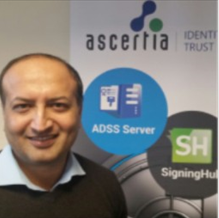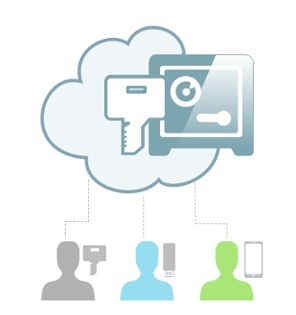Ensuring secure, remote signing doesn't have to be challenging. In our latest blog, we're discussing cloud signing and the ease of using advanced PKI digital signatures.
Background of advanced digital signatures
Advanced digital signatures require each user to have their own unique signing key. The security of the system then relies on the fact that the user's private signing key is not accessible to anyone else other than the owner.
If implemented properly it allows an independent judge to determine that any digital signatures produced with the user's private key must have been created by the owner and no one else. It ensures the "non-repudiation" property, where signers can't reasonably deny the signatures they have created.
Cloud signing - solving digital signature challenges
Past digital signature technology was costly and issuing each user with their own private signing key in a secure manner was complex.
Now with the advent of cloud computing and, in particular, cloud Hardware Security Modules (HSMs), the situation has changed dramatically. Today, advanced digital signature technology can be low-cost, easy to use and secure, so that it can be applied to any business use case, even on a mass scale.
Advanced digital signature requirements
There is much confusion between electronic signatures and PKI digital signatures. You can learn more about it here. As a quick note, basic e-signing adds the user's mark on a document and does nothing to protect the integrity of the signed document or to prove that the user actually made that mark.
With PKI digital signatures, cryptographic codes are created using privately-held signing keys under the control of the signer. They ensure data integrity and strong authentication of the user - cryptographically-binding the user's authenticated digital identity to their signed documents.
There are many cloud e-sign providers who simply implement basic electronic signature squiggles on a document with no cryptographic evidence embedded into the signed document to independently prove it was indeed the user who made that mark.
Most high-trust schemes however, require PKI-based digital signatures where each user has their own private signing key. For example:
EU Qualified Signatures - These are recognised as equivalent to handwritten ink signatures in a court of law and require use of unique user keys held in secure cryptographic hardware.
Adobe AATL Signatures - This is a trust scheme run by Adobe for its Reader/Acrobat product range. Similarly, it requires unique user keys and protection of these in secure cryptographic hardware. Adobe software automatically marks signatures as "trusted" if the signing key was certified by an AATL-recognised Certificate Authority (CA).
Traditionally, the protection of the user's private signing key was achieved by storing it within tamper-resistant cryptographic hardware devices, like smartcards and secure USB tokens. These are PIN-protected and kept under the control of their users.
Problems with smartcards / tokens and the rise of server-held keys
Although there are many examples of e-Trust schemes relying on smartcards/tokens, in particular electronic ID (eID) cards issued by many governments, the general purpose use of these devices has been limited. This is mainly due to:
- Complex to use - In the case of smartcards, the user needs specialist reader devices, which are not generally available. Using such devices on mobile phones is even harder.
- Forgotten tokens - Often users forget to bring their tokens when needed or lose/misplace them. Also, use of such tokens in public areas is sometimes blocked or there are no readers available.
- Expensive to deploy - The cost of providing the secure devices (and readers) to each end-user is often too high for most business applications where a large number of users are involved.
- Browser compatibility issues - Using smartcards/USB tokens requires web applications to deploy Java applets. The latest browser versions (e.g. Google Chrome) are blocking such technology because of various security issues. Even where the browser allows Java, the frequent pop-up warning messages make non-technical users nervous.
To overcome this, the industry is moving to server-held signing keys i.e. each user's signing key is managed in a centrally-held HSM. As an example, the new EU eIDAS Regulations allow EU Qualified Signatures to be created using server-held signing keys - as long as they're managed securely. Similarly, Adobe AATL Signatures can be created using server-held keys.
However, before Cloud HSMs deploying a server-side signing solution was complex. Basically, you needed to purchase an HSM appliance and install, configure, patch and maintain these security devices. So, although the complexity of smartcards/USB signing devices was hidden from the end-users perspective by using HSMs, IT departments still had the complexity of managing them.
Today, Azure and Amazon cloud platforms offer cloud HSMs as part of their service. This means you can now deploy an advanced digital signature solution using unique user signing keys with strong hardware-based protection, at a fraction of the cost and complexity compared to an on-premise HSM solution. At the same time, you can also meet the needs of high-trust schemes like Adobe AATL and EU regulations.
Cloud signing with SigningHub
SigningHub has extensive support for secure, cloud-based digital signatures which includes:
- Support Azure Key Vault HSMs - For generating and managing unique user keys and creating advanced, EU Qualified and Adobe AATL signatures. SigningHub is the first global signing platform to integrate with the Azure Key Vault, see the Microsoft blog here for more details.
- Ability to interwork with a number of existing PKI service provider partners for AATL, EU Qualified and other high-trust certificates including:
- Ability to host your own private PKI infrastructure components, such as private Certificate Authorities (CAs), OCSP Validation Authorities and Time Stamp Authority (TSA) servers using Ascertia ADSS Server.





